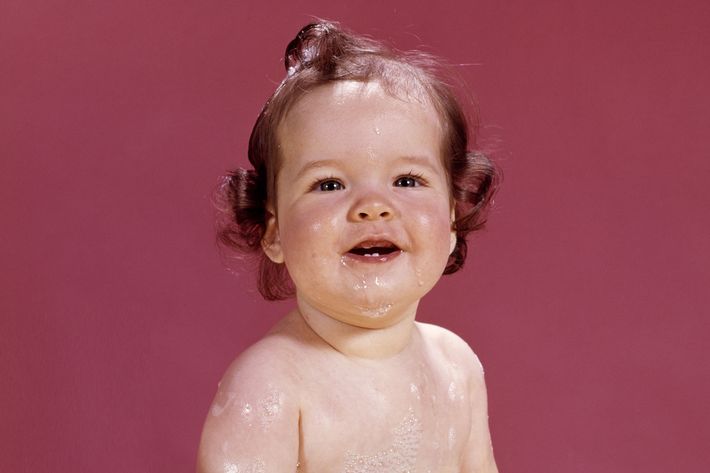Because no two paths to parenthood look the same, the Cut’s How I Got This Baby invites parents to share their stories. Want to share yours? Email gotbaby@thecut.com and tell us a bit about how you became a parent.

When older women she knew described freezing their eggs, Christine felt equal parts fascinated and hopeful she’d never experience the process firsthand. But by her early 30s, Christine found herself working at a tech company with egg-freezing benefits, in a relationship she felt unsure about, and wondering whether she should take the plunge. She describes the irony of fighting with her boyfriend about egg freezing, the ways her fertility clinic felt like a factory, deciding not to livestream her first injection, and how she feels about her 20 frozen eggs.
On making the choice to “just do it.” More than one of my colleagues had frozen their eggs. My initial reaction was that egg freezing was novel and interesting, but I hoped I didn’t have to do it someday.
Then, in my early 30s, I started working at a tech company that offered egg freezing as a benefit. I’d been thinking about that ever since I started working there, but once I realized I was going to try to leave that job, I decided I should just do it.
My boyfriend at the time lived in California, and I was going back and forth between California and New York. We’d been talking about whether I should freeze my eggs, and it seemed like a good idea because … our future was very TBD.
Later, it became a huge fight and kind of the crux of why that relationship went on to fail. Now that I’ve had some time to think about it, I think I was fairly hurt that he didn’t come to New York to support me through the process, even though I knew it would have been impossible for him because of work. And on a macro level, I was angry that I felt compelled to do this — that I didn’t seem to be in a relationship that was going anywhere. My resentment started to snowball.
I did not miss the irony of it: We broke up over egg freezing. Which I was doing because I wanted to have a partner and a family, and I ended up breaking up with the person I was with because of it.
On getting ready. Once I started doing research, I realized I needed to do all this work to prepare — it wasn’t like I could just walk into a clinic and start.
The clinic I went to was one a friend of mine had recommended. The doctor I saw was very casual, a total pro — he’s been in the business for years. He had a whole speech; it wasn’t salesman-y, but he did note my age, which was 34, and started drawing a graph.
He drew this line plummeting downward to symbolize the trajectory of my fertility. It was very dark, to me, but he was so casual that I felt like I would be a fool not to do this. He explained the clinic’s success rates, and told me that many of the women he sees for IVF reasons wish they had frozen their eggs. The consultation wasn’t personal, and definitely no more than ten minutes. I started the process about two weeks later.
On being in “do” mode. Before the first day, I’d told all my friends what I was doing. Facebook Live was new, and I decided I wanted to stream the process and had invited a group of friends to watch. Then I totally chickened out, because it was way too scary. I ended up calling my boyfriend and FaceTiming him through the first shot. After that first shot, it did get a lot easier. If you can do it once, you can do it 20 times.
Though I did back out of livestreaming, I was very into posting about egg freezing while I was doing it. I hadn’t thought of it as being very stigmatized, but then I started reading blogs where women were writing about how glad they were when people would talk about it. I was a little surprised — I thought it was cooler than that, not stigmatized. My attitude was like, Isn’t science wild? I was hoping that other people considering the process might be inspired in some way. I was hoping I could document more of a journey, but once I actually did it, the experience felt a lot more mundane than that. By the end, I did feel moved and emotional — but during it, the process felt more like drudgery.
Because of the time pressure, I didn’t really give myself time to think too much about the emotional aspects, and that’s probably why I had a meltdown with my boyfriend at the end. It was more like I was purely in a “do” mode.
On the assembly-line aspect. People had told me not to feel alarmed if I felt like I was in a factory. You’re waiting, you get your blood drawn, you sign your paperwork, you leave. You really feel like cattle while you’re in there, being shuttled through a fairly small facility, getting in line with all these other women. There’s definitely no hand-holding or any real connection to the process.
I don’t know how it is at other clinics. But I did talk to some friends, and they said the experience was similar for them: Whenever you go do bloodwork or have tests run, you’re in a room with 40 or so other women, all a mix of IVF, consultations, egg freezing. Sometimes partners are there. It feels very meshed together. There’s not so much a feeling of “oh, I’m taking control of my reproduction! I’m doing this great thing.” All these other women are sort of grasping at their reproduction, together. It felt like we were all a part of the same big experiment.
Sometimes it felt really good to know I wasn’t the only person doing this kind of strange thing. Being at the clinic was also kind of a reality check, seeing how many women were having some kind of reproductive challenge. I think it was hard for me, mentally, thinking about where I was in my life.
On completing the process. The hormone treatment lasts about two weeks, and depends on how your body responds. The first part is a shot that’s very easy to administer — mine came in a case that looked like a Caboodle, and the shot itself like a plastic toy syringe. It’s designed so it’s not hard to use; you just twist it, inject it, and put it back in the case.
Then you add a second shot every day, which was more painful and to me, more stressful. You have to take a vial of liquid and mix a powder in, making sure you’re getting everything right. Once your hormones get to a certain level, you’re ready for the trigger shot — that’s the shot you do the night before the egg retrieval.
I’d never been put under for anything before I did the retrieval. You have to have someone with you to take you home afterward, because you’re so out of it. My boyfriend wasn’t there, so I had a male friend with me. I remember being upset my boyfriend couldn’t come. Instead, my friend was just someone who happened to be available.
They got me ready and then took me into the operating room, which I remember as such a clichéd scene: There was 1970s rock playing from a tinny radio, lots of doctors and nurses scuttling around. Every was very casual. Before I knew it, I was out — no countdown, nothing.
When I woke up, I was in the recovery room.
On understanding results and costs. Later, they told me how many eggs they got and said, “Great job!” like I’d done something. Twenty of those eggs were able to be frozen. About a week after that, I got a normal-looking envelope from the clinic and inside there was a photo of the eggs, no context, nothing. It was just a bunch of little eggs in black-and-white. I was thinking about putting them on my refrigerator, but that’s too weird. I did think it was amazing and weird — this was a part of me that could potentially be my children. Twenty cells that could potentially be children, just floating around in a Petri dish.
Going in, I hadn’t really understood the actual success rates — like when a fertility clinic is marketing themselves as a 90 percent successful freeze rate, that doesn’t say anything about an actual viable pregnancy. These are other factors people should consider. If egg freezing is only going to result in a small number of eggs, the odds aren’t great. Even with 20 eggs, I’m not that confident about my chances. I’ll be happy, if I do need to use them, if one or two ends up working.
Egg freezing costs something like $15,000, not counting what you pay to store them. I’m paying something like $1,000 a year for storage now. My job covered almost all of it, but not quite all of the medication costs. I ended up spending about $800, which is still great. But the way egg freezing was positioned to me was there would be no cost. That definitely wasn’t the case. Still, I’m so grateful that I didn’t have to pay for it out-of-pocket.
On what she would have done differently. I’ve continued to read about egg freezing, and I’ve seen so many blogs about multiple rounds of IVF not working. I think that’s something many people, including me, go into egg freezing without fully thinking about it: If you’re going to use your eggs someday, you have to do IVF, which isn’t exactly a guarantee.
I think if I’d had more time, I would have done more research and waited a little while. And if it wasn’t covered, I definitely wouldn’t have frozen my eggs. I thought I would feel a weight lifted afterward — like, My eggs are frozen, I can date whoever I want and not worry about having a family! But I definitely don’t feel that way. I still feel a lot of pressure to start a family soon. There’s a little bit of me that’s like, Well, at least I have frozen eggs … Still, I feel like I need to settle down in the next two years, get pregnant in the next three.
I’m dating someone now, and we’ve been dating for four months. My friends were a little surprised when I told them I explained to him that I froze my eggs on our second or third date — I felt like it was cool, that he would appreciate not having to worry, I guess. I’m 35, and he’s 39; at our age, people always wonder whether you want a family. Now I realize telling him makes a very strong statement: I care enough about having a family that I froze my eggs. I can see that as being kind of intimidating. But again, having a family is part of my long-term plan, so people should probably know about it. Now that we’ve been dating longer, I think he thinks it’s a good thing.
On what women should know about egg freezing. Freezing my eggs was not a magic bullet that made me feel confident and free. It just afforded me a little bit of a fall-back plan, psychologically. The way fertility clinics are marketing on Instagram and Facebook, talking about “freezing the clock” — I think that’s very predatory and bad. It’s totally preying on insecurities. And freezing your eggs is not an insurance plan. It’s also not a breeze, and it’s not cheap.
I know of women who froze their eggs, and it did not work out. That’s very sobering to hear about. I was reading the blog of a woman who tried multiple rounds of IVF with the eggs she’d frozen, and none of them worked. She wrote about how she now feels conflicted about her original enthusiasm for the process, and how she would have considered trying to freeze embryos rather than eggs, if she could start over. It makes me sad to think about the careerist women who are seeing ads on Facebook and assuming they’ll be able to have that family in ten years. Sure, it is possible, but it’s not guaranteed. The way egg freezing is marketed is not realistic. I don’t think I was ever told how many women come back to actually use their eggs. That would have been good to know.
Overall, freezing my eggs wasn’t a bad experience. My one piece of advice to anyone interested is to do a lot of research, about what they will or won’t get out of it. Especially if they’re spending a lot of money.




